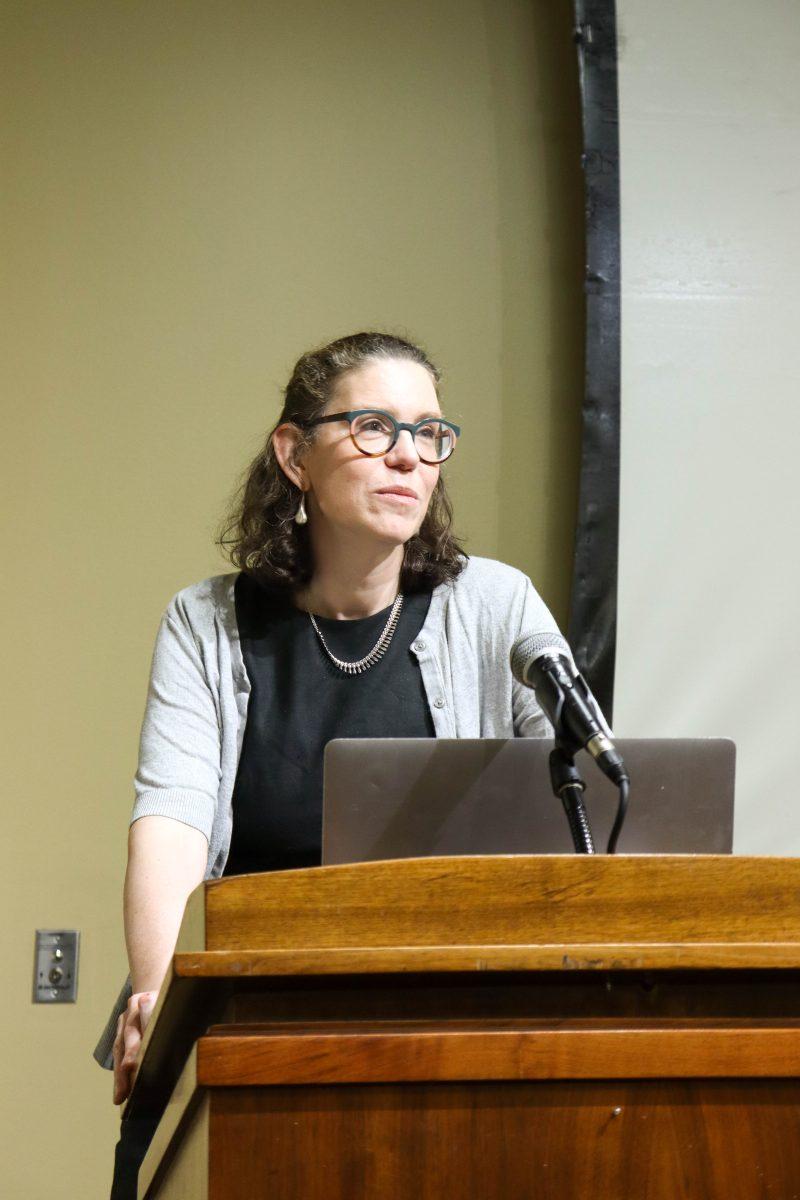Washington Post journalist Megan McArdle spoke with students and staff at Texas A&M about the business models of modern media and its relationship with politics and influence on the future of journalism.
At 6 p.m. on March 23, The Private Enterprise Research Center, or PERC, at Texas A&M hosted McArdle, a Washington Post columnist and author of “The Up Side of Down: Why Failing Well Is the Key to Success,” in the Memorial Student Center to breakdown and discuss modern media.
McArdle started her discussion saying there is a strong desire for the nostalgic 1950’s journalism, of a “just the facts” type of reporting. The standards of today’s media are not what they used to be, and economics has really changed the game of the industry, McArdle said.
“I spend a lot of time listening to complaints about my profession, as you may have gathered by now,” McArdle said. “A lot of the complaints are totally legitimate, but ultimately, the changes a lot of people are protesting didn’t happen because journalists decided to be awful. They happened because of the economic forces reshaping our industry.”
McArdle said these economic changes have slowly crippled the journalism industry.
“Most communities don’t have a newspaper, or their newspaper is a hollow carcass that is slowly being stripped by vulture capitalists,” McArdle said. “These newspapers are going to die, simply because the market has changed.”
She said it doesn’t stop with the decline of local newspapers but having a weak journalism industry also has national implications.
“One thing that changes is that now everyone is basically getting their news from Washington and New York,” McArdle said. “There are little outposts in Chicago, L.A. and San Francisco, but functionally almost all the news you consume is produced in two cities.”
McArdle said the problem with having so few newspapers around the country by saying that these two cities are not like the rest of the world and that we begin to have a disconnect with people living in other states around the country.
“Communities are losing stories,” McArdle said. “They are losing all of the information. People who are doing all the boring work of covering the city council meeting, making sure government officials aren’t looting the schools and all of that stuff that was just done by a newspaper that was subsidized by advertisers is not being done anymore.”
After concluding her talk, McArdle spoke with The Battalion to further explain how politics and the economy directly influence the media.
“I think they are feeding each other,” McArdle said. “As people are more partisan, they are more interested in being fed news that feeds their partisan identity. As that happens we then feed the partisan divide because we give people more reasons to hate the other side and stick with their own people.”
Despite this new standard, the relationship between economics and politics has brought, there is hope, McArdle said.
“Fashions do change,” McArdle said. “I think my hope is that people get tired, it’s exhausting, the screaming and the yelling and all of it, it’s unpleasant and doesn’t make anyone happier. I’m hoping that people find more positive substitutes for constantly hearing the worst about each other.”
Executive Associate Director at PERC Andrew Rettenmaier said his organization strives to bring in quality speakers for everyone at A&M while also stressing the importance of economics.
“We do this for the folks here at A&M to have exposure to economists or people who write about economics,” Rettenmaier said. “We look at economic policy issues. Our policy focus is looking at market-oriented solutions to public policy problems. We are looking at how economic markets can inform policy discussion.”
PERC professor Jonathan Meer discussed the purpose and importance of hosting these lectures. It’s important to see how people interact with the government and the economy, Meer said.
“It’s all about decision making,” Meer said. “Decisions are affected by bigger forces, so understanding those things is incredibly important, it’s about having students be able to hear world-famous journalists or world-famous economists come and talk.”
Meer explained why these events are especially important for all students at A&M.
“That’s why you are here, that’s why you are in college at [A&M],” Meer said. “We learn from these experiences so we can build on them and see what opportunities there are out there for us. We can find out about things we may have never even heard of if it wasn’t for coming to something like this.”









